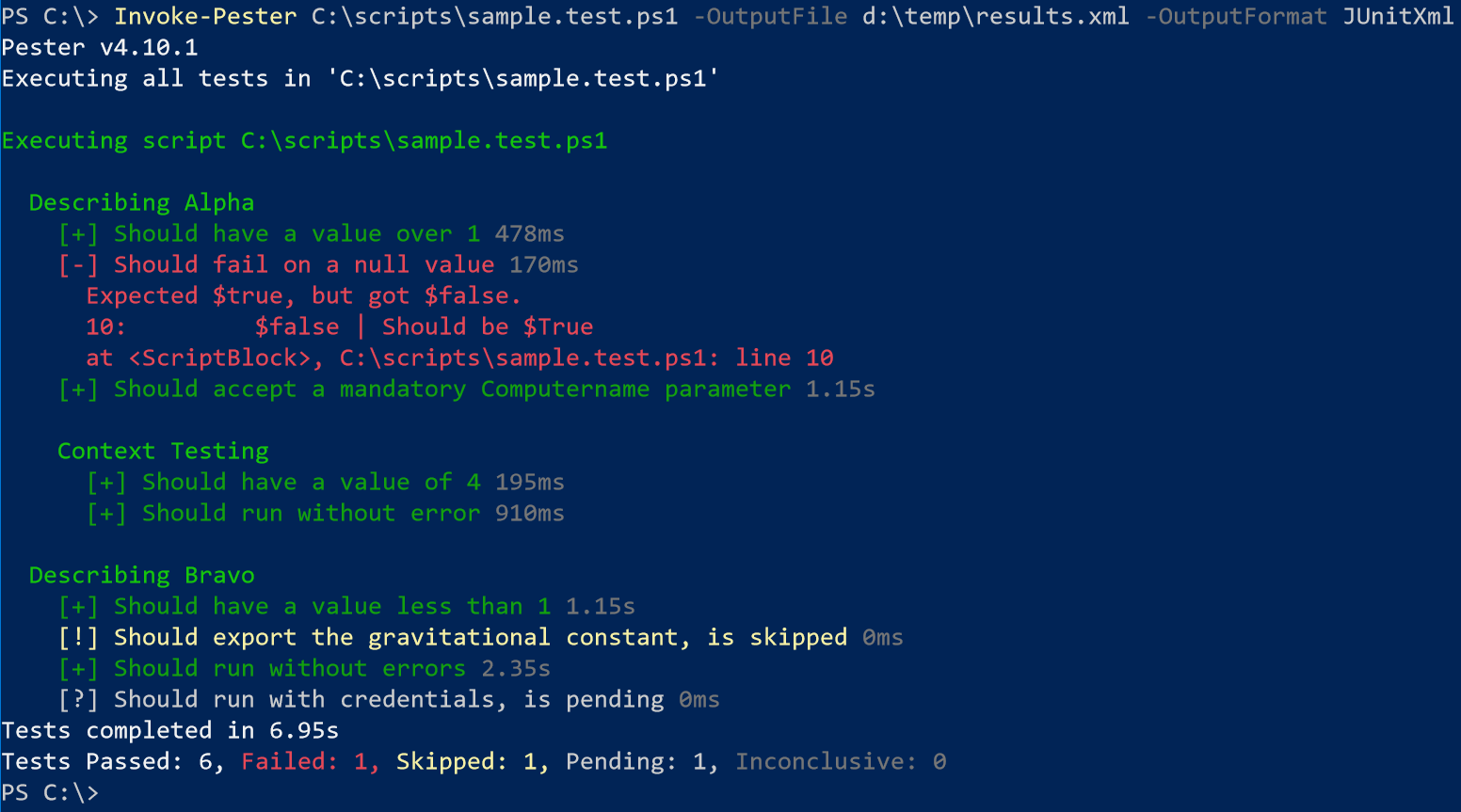
When I continue debugging I hit this error. If I set a breakpoint at global variable declaration at the top of the script (after the parameter block) I can see that my parameters have values. I expect PowerShell to take in my parameter and run the script.
#Invoke pester code#
It will also set the exit code of the process to the number of failed tests, which is problematic as any non-zero exit code will.

# check server size $server_size_test = (Get-AzVM -ResourceGroupName $rg_name -Name $server).ParameterBindingValidationException: Cannot bind argument to parameter 'clientId' because it is an empty string.Īt .CheckActionPreference(FunctionContext funcContext, Exception exception)Īt .ActionCallInstruction`2.Run(InterpretedFrame frame)Īt .EnterTr圜atchFinallyInstruction.Run(InterpretedFrame frame)Īt .Interpreter.Run(InterpretedFrame frame)Īt .LightLambda.RunVoid1(T0 arg0)Īt .RunClause(Action`1 clause, Object dollarUnderbar, Object inputToProcess)Īt .DoEndProcessing()Īt .Complete()Īt, C:\Program Files\WindowsPowerShell\Modules\Pester\5.1.0\Pester.psm1: line 2903Īt Invoke-File, C:\Program Files\WindowsPowerShell\Modules\Pester\5.1.0\Pester.psm1: line 2912Īt Invoke-BlockContainer, C:\Program Files\WindowsPowerShell\Modules\Pester\5.1.0\Pester.psm1: line 2837Īt Discover-Test, C:\Program Files\WindowsPowerShell\Modules\Pester\5.1.0\Pester.psm1: line 1411Īt Invoke-Test, C:\Program Files\WindowsPowerShell\Modules\Pester\5.1.0\Pester.psm1: line 2356Īt Invoke-Pester, C:\Program Files\WindowsPowerShell\Modules\Pester\5.1.0\Pester.psm1: line 4754Īt, C:\Program Files\WindowsPowerShell\Modules\Pester\5.1.0\Pester.psm1: line 8471Īt Invoke-Interactively, C:\Program Files\WindowsPowerShell\Modules\Pester\5.1.0\Pester.psm1: line 8475Īt Describe, C:\Program Files\WindowsPowerShell\Modules\Pester\5.1.0\Pester.psm1: line 8444 The -CI argument to Invoke-Pester will save test results in an xml file (NUnitXML compatible) in the same folder. $server_size = "Standard_DS2_v2" $server_count = $server_untĬontext "Check if resource group exist" ).count Invoke scriptįollowing script (run-tests-after-build.ps1) is running tests and generating output with tests results in NUnit format. Scripts are available in this GitHub repository.

To run a pester tests we will create a PowerShell launcher script which will run the tests (invoke-pester) and test definition files (*.tests.ps1) including all the tests.

This has some nice color coding and is generally easy to read but soon falls short when invoking hundreds or thousands of tests. There are 3 types of tests we can run depending on connectivity requirements. Running Invoke-Pester to execute these tests comes back with an output that looks like this: Invoke-Pester -Path C:\1 Click on image for larger view.
#Invoke pester how to#
I will describe how to use it for running infrastructure and configuration tests.

Pester PowerShell module is a test framework (home page and GitHub repository) you can use for writing tests in TDD (test-driven development) environment. All scripts are available in DBAinTheCloud, Github repository. Now I will describe how to add and run tests as part of the deployment pipeline with use of Pester module. In my previous post, I have described how to create an Azure DevOps pipeline to build and destroy the SQL server.


 0 kommentar(er)
0 kommentar(er)
